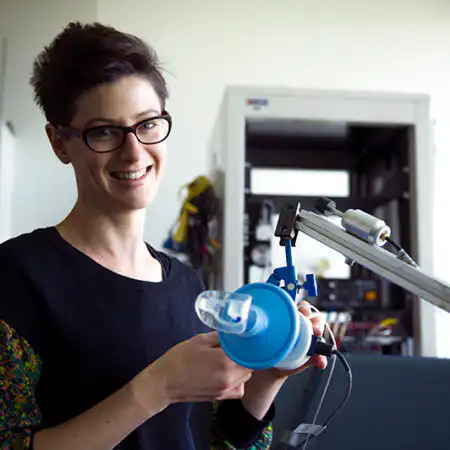What are some of the key findings, progress and discoveries you have made with your research to date – and how will this make a difference to patients with this disease?
I have discovered that the way the brain controls breathing is changed in some people with chronic obstructive pulmonary disease (COPD). In comparison to young healthy people (in whom rhythmic breathing is controlled automatically by the respiratory centres in the brain stem), I detected abnormal activation in a secondary region in the brain (the sensorimotor cortex) that is usually reserved for voluntary control of the respiratory muscles. This abnormal activation occurred in approximately 40% of the people with COPD I tested. However, I also tested older people without COPD and found a similar rate of abnormal sensorimotor cortical activation, thus determining that the change in brain activity was not related to factors such as compromised lung function in people with COPD, but rather due to age. My finding may have implications for people with COPD of more advanced age. I have commenced a follow-up study to investigate the link between this altered brain activation and the symptom of breathlessness (dyspnoea) in COPD.
In addition, I am investigating how the mechanics of the chest and muscles are altered in COPD. The neural control of breathing is usually matched to muscle mechanics as it provides an efficient strategy to ventilate the lungs. Therefore, I will also determine the implications of mechanical changes in COPD on the neural control of the respiratory muscles in these patients. Through my research, detection of any neural impairment in the mis-match between respiratory muscle mechanics and neural control could improve treatment via targeted physiotherapy or other interventions.
I am thankful to all previous and future participants who have volunteered for my research studies.
What do you hope to achieve with this research project?
My research will detect neural impairments in respiratory motor control in COPD. Coordinated and efficient contraction of the respiratory muscles is required to ventilate the lungs. Given the respiratory muscles are weak and mechanics of the chest and lungs are compromised in people with COPD, I will determine what changes occur in the way the central nervous system controls the respiratory muscles in COPD and how it relates to breathlessness (dyspnoea), a debilitating symptom of the disease. Through detection of neural impairments in COPD, I aim to identify new targets for therapy to reduce respiratory morbidity in patients with COPD.
How important was the funding from Lung Foundation Australia to your work?
Funding from LFA has allowed me to apply my expertise in human respiratory physiology to the debilitating disease of chronic obstructive pulmonary disease. Given there is no cure for the disease, improved understanding of the mechanisms of the disease and identification of new targets for treatment to improve disease symptoms are critical.
Personally, the fellowship came at a key point in my career. I was a mid-career researcher returning from maternity leave and the fellowship has given me independence to forge a unique research path.
Do you have a message for Lung Foundation Australia’s supporters?
In the course of my research project, I have met only a small proportion of Australians living with COPD. I have been moved by their personal stories and their struggle with the disease. I would be honoured and incredibly rewarded if my research can improve the lives of these individuals I have met. It is indescribable to imagine helping all people living with COPD. The individuals with COPD I have met are an even smaller proportion of Australians living with a whole range of debilitating lung diseases. By support of Lung Foundation Australia, together, we can aspire to improve the lives of all these individuals.
Was this page helpful?
Good job! Please give your positive feedback
How could we improve this post? Please Help us.
